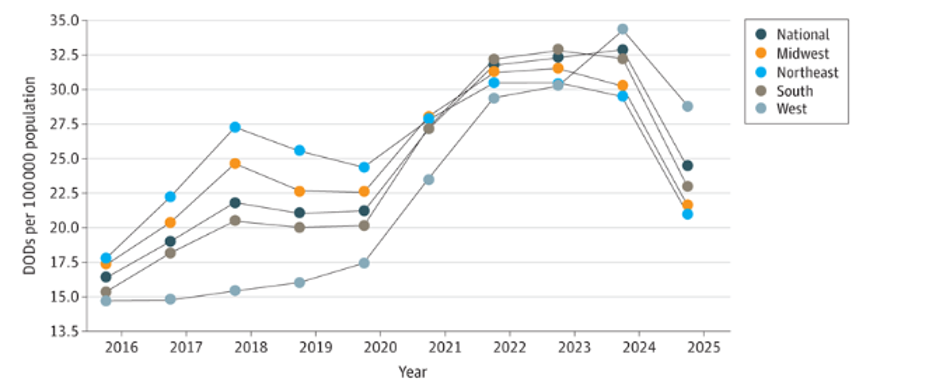Friday Shorts: Vaccination meeting, trans needs, preventing ovarian cancer, and drug ODs
June 27, 2025
A. Turbulent ACIP meeting suggests changes in federal vaccine policy
The Advisory Committee on Immunization Practices (ACIP) meeting from June 25-26 is over and the good news is that there are evidence-based recommendations to vaccinate pregnant women for RSV, and for a second monoclonal antibody Enflonsia for infants of unvaccinated mothers. Flu shots cotinue to be recommended, although the ACIP recommends not to offer flu shots preserved with thimeresol. This represents just 7% of the vaccines used in the U.S., and experts believe they are safe.
ACIP took no action on COVID-19 vaccinations, leaving some uncertainty for the fall vaccination season. It’s also worrisome that ACIP will be launching new reviews of well-established vaccines, including Hepatitis B and MMRV (measles, mumps, rubella and varicella; the last is the cause of chickenpox).
Here’s a link to a summary of the ACIP meeting from Katelyn Jetelina of Your Local Epidemiologist.
Here’s a link to Jeremy Faust’s Inside Medicine coverage of the first day of the ACIP meeting.
B. Survey shows special medical concerns of trans people
The US Trans Survey reported on the results of its 2022 survey of over 84,170 trans adults earlier this month. Since this data are now three years old, they might no longer be fully applicable. Fifty-seven percent of the respondents reported that they were on employer-sponsored health insurance.
They found that trans people were less likely to report their health to be good, very good or excellent (66%) compared to 81% in the general population. Those who had medically transitioned were more likely to report good or better health (67%) compared to those who had not medically transitioned (58%). Almost one-quarter (24%) reported that they had avoided health care in the past year for fear of being mistreated, and 26% of those with insurance reported negative experiences with their insurer related to their trans status.
C. Fallopian tube removal lowers ovarian cancer rates
StatNews reports that many ovarian cancers begin in the fallopian tubes, and women seeking permanent contraception are increasingly choosing salpingectomy, removal of fallopian tubes, instead of tubal ligation, or “tube tying.” The American College of Obstetrics and Gynecology has recommended offering this procedure since 2015 for people having hysterectomies or considering tubal ligation. Some health insurers do not cover this procedure.
D. Decline in U.S. drug overdose deaths is unevenly distributed
Drug overdose rates by region 2015-2024
Source: Post, et al JAMA Network Open June 12, 2025
Drug overdose rates went down in 2023 for all age groups except those over age 55, and went down for all racial groups except Indigenous, Hispanic, and Black people. Drug overdose rates per 100,000 remain over twice as high for men (44.8) than women (18.2), and are over 50% higher in Black people (48.9) than White people (30.9). Despite the decline over the past two years, drug overdose rates remain higher than they were before the COVID-19 pandemic. Here’s a link to a previous post on what employers are doing to be “recovery friendly” workplaces.




